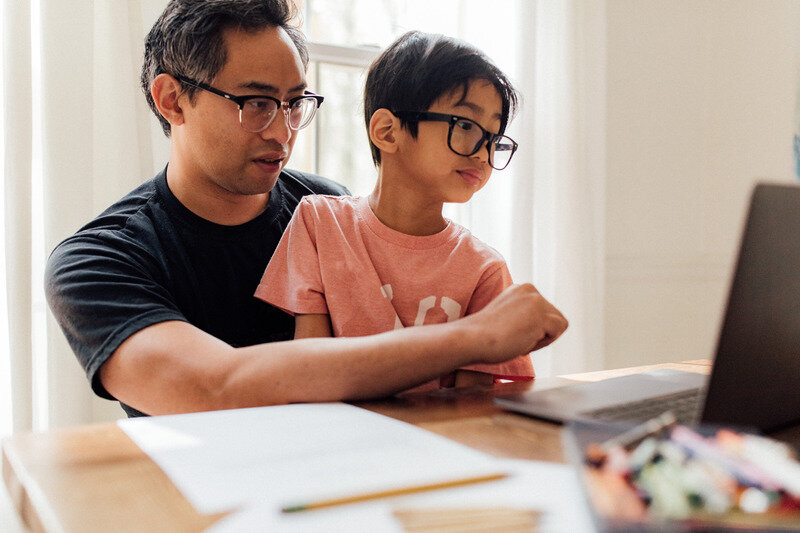Home Schooling Tips
Are you stressing about this new learning environment? If so, we will give you tips on how you and your student will get through this pandemic.
With the Coronavirus closing up campuses, we have all been forced to adapt quickly to electronic distance working tools. These times can be stressful for both students and parents as they attempt to conform to their school’s e-learning environment. For any difficulties with the transition, Link Educational Institute can assist you with the homeschooling process and ease the stress in your household. For now, these tips will help you get through this unforeseen time.
Follow a flexible schedule
The most crucial homeschooling tip is coming up with a steady routine. The routine should be consistent and work well for both the parent and student. Creating a flexible yet consistent schedule will prevent your student from thinking that this pandemic is an extended vacation. If your student is not in the mood to do mathematics, have them focus on a different subject that will hold their attention, such as drawing or reading. If you need help creating a schedule, look for samples online such as this homeschooling schedule.
Instead of creating a schedule based on your student's subjects, delegate time slots for more general academic review, reading/writing, and doing chores. Touch base often to make sure your student is making progress and on track to learn new skills for both school and life.
Have a Firm Study Space
With students being home, they have plenty of distractions, such as watching television, eating, or playing with the family pet. Have a study space that will associate with the specific environment with learning instead of relaxing. It doesn't have to be a room- it could be the table in the kitchen. Make sure the space has all the tools the student will need including writing materials, sufficient sources to electricity for your laptop, and WATER. It's the student's responsibility to make the right choices for their learning environment.
Use Top-Quality Teaching Resources
Parents should be aware of various online and offline resources that can help their students during this pandemic.
Khan Academy- Offers tutorial videos and instructions on various school subjects.
Ted Talks- Presenters will talk about a variety of topics such as business, science, technology, etc.
Duolingo- A language learning platform with up to 30 languages.
Quizlet - This digital website is for making and using flashcards.
Calvert Homeschool - A program that contains videos and exercises grades 3-12.
Additional offline resources include:
Podcasts
Storytelling Videos
Documentaries
Textbooks
YouTube Videos showing mathematics, science, language, etc.
Get in touch with the school or your student's teacher to figure out what your child was studying before the Coronavirus pandemic started. If you have young children, you can create worksheets and flashcards. Download free pre-made worksheets.
Customize Lessons and Activities
When you create your child's homeschool curriculum, keep in mind their interest and learning style. For instance, if your student loves to write, give them a couple of hours each day to write short stories. Their work can turn into a portfolio. If you have older students, have them work on a passion project where they can research, write a report, and present their findings. Your student will be enthusiastic about school when they are passionate about something.
Parents and Students Should Take Breaks
You don't want your child to keep studying all day, especially if you have younger children. Give your student 10 to 15-minute breaks plus a long half-hour recess around lunch. If you have older students, give them 10-minute breaks about every hour. They can go for walks to get blood pumping and energy levels high. Parents also deserve a break from their job and homeschooling. Go for a walk, chat with a friend, and find a way to model good behaviors.
Limit Screen Time As Possible
It's easy to give your student a tablet and have them learn through the device. Young children need to improve their hand-eye coordination and interpersonal skills. Parents should focus a young child's attention on non-screen activities such as
Throwing/Catching a Ball
Arts and Crafts
Creative Writing
Silent Reading
If you can't limit screen time, don't feel bad about it. We understand that parents have to homeschool and work at the same time. Make sure that your student is busy and learning during this time.
Give Praise to your Student
This unforeseen time has put pressure on students and parents. It is paramount that you keep it positive by praising your student and telling them what they are doing well in this everchanging learning environment. If you have a younger child and noticed that they are adapting especially well, then praise them on their maturity. If you have a student in high school and noticed that they are doing well in Algebra, then give them praise for their problem-solving skills. Give your student positive praise when they're providing their best effort.
Be Nice to Yourself
No parent ever expected to be homeschooling their student (s) this year. It's normal to feel stressed. As a parent, you should love yourself and know that you're doing your best. Good and bad days are expected, during this, unforeseen time. Whether you're a stay at home parent or new to homeschooling, we hope these tips can get you through this tough time. We're in this together.


